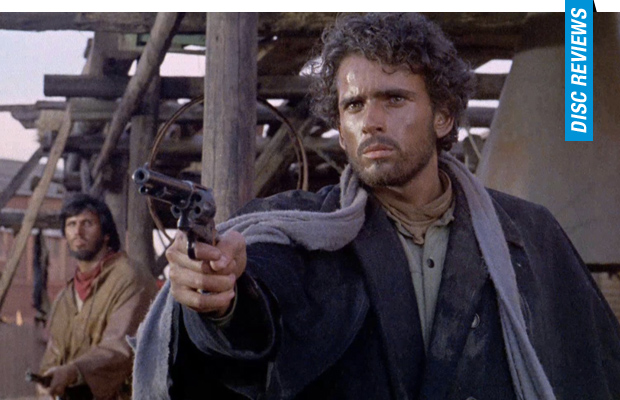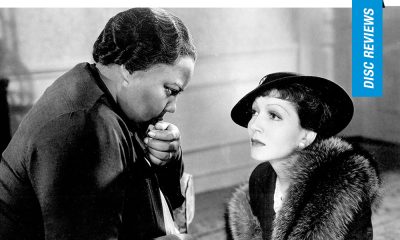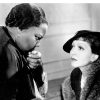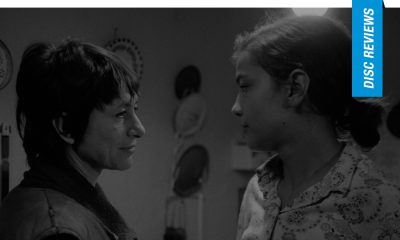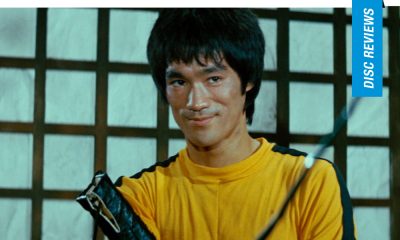Disc Reviews
The Unholy Four (1970) | Blu-ray Review
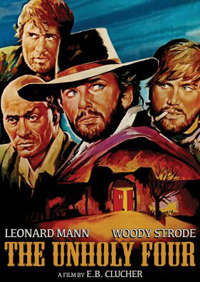 If you prefer your spaghetti westerns with extra cheese (or sleaze, maybe), then director E.B. Clucher’s 1970 directorial debut The Unholy Four might be the obscurity you’re looking to uncover. Clucher, also known by his Italian moniker Enzo Barboni, suggests a quartet of vigilantes by the title, but the main focus of this narrative (which was penned by Django screenwriter Franco Rossetti, and Mario di Nardo, better known for his work on a couple Mario Bava flicks) is an amnesiac criminal played by Leonard Mann who breaks out of prison with a trio of criminals and ends up in the village he came from, where his identity is locked into the town’s historical war between two familial clans. Silly and a bit derivative, this dubbed schlocker is mostly for fans of risible pulp, although several unintentional moments of comedy create little gems of reprieve scattered over this rawhide.
If you prefer your spaghetti westerns with extra cheese (or sleaze, maybe), then director E.B. Clucher’s 1970 directorial debut The Unholy Four might be the obscurity you’re looking to uncover. Clucher, also known by his Italian moniker Enzo Barboni, suggests a quartet of vigilantes by the title, but the main focus of this narrative (which was penned by Django screenwriter Franco Rossetti, and Mario di Nardo, better known for his work on a couple Mario Bava flicks) is an amnesiac criminal played by Leonard Mann who breaks out of prison with a trio of criminals and ends up in the village he came from, where his identity is locked into the town’s historical war between two familial clans. Silly and a bit derivative, this dubbed schlocker is mostly for fans of risible pulp, although several unintentional moments of comedy create little gems of reprieve scattered over this rawhide.
When a gang of robbers attempting to steal gold, they set a madhouse on fire as a diversion, resulting in four of the inmates escaping unharmed. One of them, however, is an amnesiac trying to determine his identity. The others confirm his name is Chuck Mool (Leonard Mann) but not much else. Eventually, they make their way to Mool’s hometown, but since he still can’t remember who he is, his family’s rivals, including the malevolent Udo (Giuseppe Lauricella) convince Mool he is a member of their family and he must murder the Caldwell patriarch, their enemy (who is actually Mool’s own father).
If you were in doubt about Clucher’s obliviousness to proper tone, one need look no further than the jaunty, repetitive main score from Riz Ortolani (whose contributions on Day of Anger, a 1975 Lee Van Cleef spaghetti western, were a bit more cohesive) recycled at odd moments, a bumbling refrain connoting comical interludes while the film seems determined to remain grim, serious, and tacky in the glorious tradition of exploitational genre items depending on shock value to shake up the story. A dueling tangent suggesting incest presents itself when Ida Galli’s Sheila must avoid the advances of her brother Udo, while she’s later forced to pretend she’s the brother of Mann as a cruel plot twist, although he decides to sleep with her even though he can’t remember he’s not actually her brother.
Leonard Mann (aka Leonardo Manzanella) was being groomed to be the next Franco Nero, and Clucher, who had been heretofore known as a cinematographer, including on the Nero headlined Django, was perhaps a bit too dependent on this sort of formula for The Unholy Four. In retrospect, a historical interest in supporting player Woody Strode, here playing the token racial other, tortured by the criminals looking to exact vengeance on Mann’s ridiculously named Chuck Mool, while their two white compatriots (Peter Martell, George Eastman) get to lounge about until the action dictates otherwise.
Salty and silly, there are some grand reveals (with dramatic impact hinging on racially charged inferences) which also assist in making The Unholy Four seem unforgivably archaic. However, the film seemed a template for Clucher/Barboni, who later the same year unveiled his first title in what would become a gunfighter quartet (he helmed all but the third entry) with They Call Me Trinity, with Terence Hill, who starred as the protagonist in the first three of four films spanning 1970 to 1994.
Disc Review:
Kino Lorber presents the forgotten title under its Studio Classics label in 1.85:1 in an otherwise unadorned transfer. Picture and sound quality are better than could otherwise be expected for a film wishing to seem a lot more serious than it actually is, though the film is lensed appropriately by Mario Montouri (son of the DP Carlo Montouri), whose most notable efforts were in the early 1960s, like Robert Aldrich epic Sodom and Gomorrah (1962) and the Sophia Loren starrer A Breath of Scandal (1960) from Michael Curtiz.
Final Thoughts:
Cheap, sleazy fun, The Unholy Four is best viewed as a piece of mindless 1970s style exploitation.
Film Rating: ★★/☆☆☆☆☆
Disc Review: ★★★/☆☆☆☆☆



